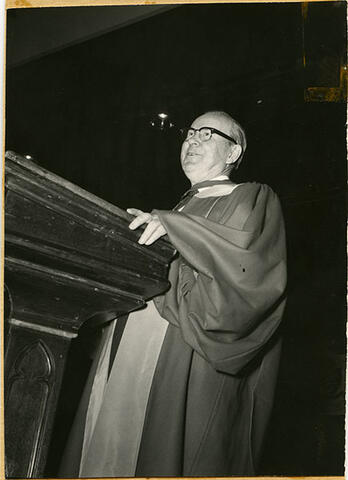
Title and statement of responsibility area
Title proper
Honourary Degrees - Addresses - Lester B. Pearson
General material designation
- Graphic material
Parallel title
Other title information
Title statements of responsibility
Title notes
Level of description
Item
Reference code
Edition area
Edition statement
Edition statement of responsibility
Class of material specific details area
Statement of scale (cartographic)
Statement of projection (cartographic)
Statement of coordinates (cartographic)
Statement of scale (architectural)
Issuing jurisdiction and denomination (philatelic)
Dates of creation area
Date(s)
-
17 May 1965 (Creation)
Physical description area
Physical description
1 photograph : b&w ; 10 x 14 cm
Publisher's series area
Title proper of publisher's series
Parallel titles of publisher's series
Other title information of publisher's series
Statement of responsibility relating to publisher's series
Numbering within publisher's series
Note on publisher's series
Archival description area
Name of creator
Custodial history
Scope and content
From back of photo: "First convocation at U of S Regina Campus. Lester B. Pearson delivering address to Convocation after receiving honourary degree". Pearson was Prime Minister of Canada at the time of presentation.
Bio/Historical Note: Lester Bowles (Mike) Pearson was a Canadian scholar, statesman, soldier, prime minister and diplomat who won the Nobel Peace Prize in 1957 for organizing the United Nations Emergency Force to resolve the Suez Canal Crisis. Pearson was born in 1897 in Newtonbrook in the township of York, Ontario. He was the 14th prime minister of Canada from 1963 to 1968, as the head of two back-to-back Liberal minority governments following elections in 1963 and 1965. During Pearson's time as prime minister, his Liberal minority governments introduced universal health care, the Canada Student Loan Program, the Canada Pension Plan, the Order of Canada, and the Maple Leaf flag. His Liberal government also unified Canada's armed forces. Pearson convened the Royal Commission on Bilingualism and Biculturalism, and he kept Canada out of the Vietnam War. In 1967 his government passed Bill C-168, which de facto abolished capital punishment in Canada by restricting it to a few capital offences for which it was never used, and which themselves were abolished in 1976. With these accomplishments, together with his groundbreaking work at the United Nations and in international diplomacy, which included his role in ending the Suez Crisis, Pearson is generally considered among the most influential Canadians of the 20th century and is ranked among the greatest Canadian prime ministers. Pearson died in Ottawa in 1972.
Notes area
Physical condition
Immediate source of acquisition
Arrangement
Language of material
Script of material
Location of originals
Availability of other formats
Restrictions on access
Terms governing use, reproduction, and publication
Photographer: Webb
Copyright holder: Unknown
Other terms: Responsibility regarding questions of copyright that may arise in the use of any images is assumed by the researcher.

